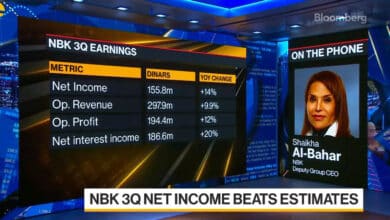NBK Group’s diversification strategy remains highly effective : Al-Bahar
KUWAIT: Shaikha Al-Bahar, Deputy Group CEO at National Bank of Kuwait said: “This was another very strong quarter for NBK in 3Q2023. Our performance remained solid with net profit reaching KD 431 million in the nine-month period, up 15.2 percent year-on-year”.

Shaikha Al-Bahar highlights NBK Group's diversification strategy during an interview with Bloomberg TV.
In an interview with Bloomberg TV, Al-Bahar highlighted that the Group’s diversification strategy remains highly effective in advancing the bank’s goals. This is evident as it continues to drive revenues and earnings growth from various locations and across business segments. “We maintained our margin expansion on the back of higher interest rates and our key focus continues to be on a healthy balance sheet and strong capitalization,” Al-Bahar added.
Solid foundation
Al-Bahar emphasized that the upsurge in profitability primarily stems from NBK’s success in achieving robust revenue growth across all core banking activities within the Group’s operations. Operating revenues surged by an impressive 15.6 percent year-on-year in the first nine months of 2023, surpassing the rise in operating expenses, which was at 10 percent.
The increase in total revenues can be attributed to the core business activities, with net interest income recording a substantial growth of 21.8 percent and fees and commissions income rising by approximately 9 percent. “Our financial stability and strength are supported by our flexible business model, which places emphasis on diversifying revenue sources across geographical regions and sectors. This approach ensures strong asset quality and the continuous expansion of our balance sheet. I believe that we will witness these same positive trends shaping our expectations for the remainder of the current year,” Al-Bahar noted.
Managed expansion
When discussing the potential for expanding the bank’s regional presence, Al-Bahar referenced the recent surge in mergers and acquisitions within the region, adding that she doesn’t believe that those expansions are justified for the Group from a risk reward perspective. Discussing NBK’s expansion strategy, Al-Bahar commented, “Our expansion strategy is very disciplined, and it will always follow and be aligned with our key strategic initiatives and priorities.
We are happy with our geographic footprint and focus more on growing our presence in our key growth markets.” “We are approaching the Saudi markets it on all fronts leveraging on our strong regional wholesale franchise, our global wealth management platform, and capabilities as well as our digital banking experience,” Al-Bahar remarked.
Robust financial mix
In response to a question regarding the high interest rates and their effects on the industry and NBK, Al-Bahar observed that recent US economic data supports the fact that the Fed is to raise its rate in one of the two remaining meetings for this year. As for Kuwait, the regulator has opted not to follow the Fed in each hike given the flexibility of the currency regime, and the currency is pegged to a weighted basket of other international currencies. “Although higher interest rates are generally positive for margins but no doubt it poses some risks to economic growth especially considering the fragile environment we have today.”
As for NBK and how this situation influences its profit margins, Al-Bahar stated, “We continue to enjoy a very healthy funding mix, with CASA at around 40 percent serving our cost base well. This factor plays a crucial role in mitigating interest costs.” Al-Bahar emphasized that the bank’s balance sheet is flexible and dominated by interest bearing assets which reflected positively in the growth of the bank’s NIM during the period by 31 bps to 2.57 percent in 9M2023 from 2.26 percent for the same period last year.
Geopolitical development
In response to inquiries regarding the influence of ongoing developments in the Middle East, Al-Bahar affirmed that the current events within the region are indeed impacting oil prices. These prices have surged by $6 to reach $91 since these events erupted. This surge indicates the market’s capacity to navigate the consequences of these developments, with no disruptions observed in global market supplies. “While the increase in oil prices may bring advantages to the budgets of oil-producing nations, including Kuwait and the GCC, it does pose a potential threat to the global economy, which is currently facing numerous challenges,” Al-Bahar remarked.
Al-Bahar cautioned about the repercussions of broadening the scope of confrontations and the adverse effects it could have on escalating inflation levels. This escalation threatens the “soft landing” that central banks worldwide strive for, potentially resulting in disruptions to global international trade and capital flows. Al-Bahar also addressed the influence of the ongoing tensions on stock markets, which are already experiencing pressure as a consequence of investor concerns in a high-interest rate environment.
Since the start of the year, all GCC markets, barring Dubai, have been on a declining trajectory compared to their global counterparts. Al-Bahar foresees that these market pressures could exacerbate if regional geopolitical tensions persist. Concerning Boursa Kuwait, Al-Bahar commented, “The correction in Kuwait has been more pronounced, with stock market indices declining by approximately 9 percent since the start of the year. However, the stability of the situation in the country could potentially bolster performance going forward, contingent upon the mitigation of the impact of geopolitical tensions.”











